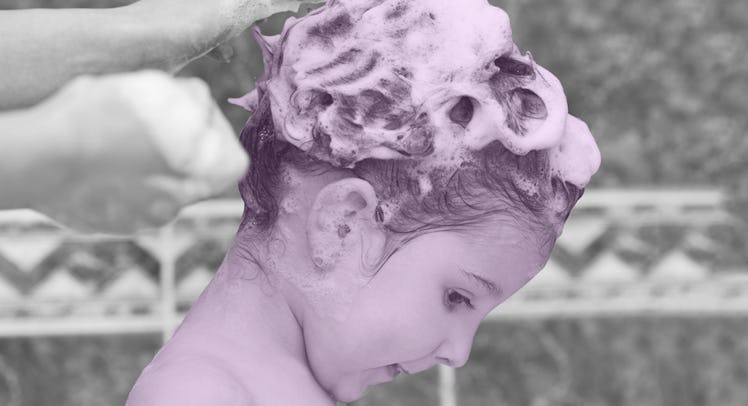How to Shop for Kid-Safe Soaps and Shampoos Outside the Baby Aisle
“Baby” products aren’t necessarily better for kids than those marketed to adults.

Kids have a ton of specialty products devoted to them: soap, shampoo, detergent, toothpaste – it goes on and on. Slap a picture of a cute baby on the bottle and make it smell like an angel’s heavenly breath and you’ve got yourself a new product line. Companies know this and do it all the time. But are these specialty products totally necessary? Not so much. In fact, there are plenty of products marketed to adults that are perfectly safe for children and even infants to use. There’s nothing wrong with using baby shampoo or baby soap, but don’t assume that it’s a necessity. It’s quite possible to find products that work for the whole family.
Finding a Soap for Kids and Adults
The first step to figuring out if a product is kid-safe? Looking for fragrances.
“Fragrance is one of the most common contact allergens and is best avoided on sensitive skin,” explains Dr. Tsippora Shainhouse, a board-certified dermatologist and a clinical instructor of pediatric dermatology at the University of Southern California. “Many baby products are actually fragranced or scented.”
For soaps, that means fragrance-free or soap-less washes. Moisturizing soaps can also be a good match for sensitive skin. The selection of fragrance-free or gentle cleansers that don’t pop up in the baby aisle may be limited, but that’s okay – adults don’t need to use harsh soaps any more than kids or babies do, so maybe that three gallon soap pump available at the super saver’s club can serve the whole family.
Finding a Detergent for Kids and Adults
For detergents, parents should focus on the “white bottles” – dye- and fragrance-free versions of established brands. Nearly every company makes a version these days. Products like fabric softener and dryer sheets, that actually add chemicals back into clothing, should be avoided altogether. When doing laundry for a child it’s best to keep things as simple as possible. If a product is advertised by a cartoon character that is absolutely enthralled by a scent, that’s a pretty good indication it might cause a rash. And, just to be clear, those are the stakes. While there are occasional cases of more violent allergic reactions to fabric softener ingredient and the like, the worst case scenario is likely some light itching.
Finding a Shampoo for Kids and Adults
Gentle soaps or all-in-one washes are sufficient to clean babies’ scalps – they tend to not have much in the way of hair – but once those kids sport a full head of hair, adult shampoos are fine. Still, there is something to be said for that “tear free” formula because shampoos are made to be acidic, which makes eye-contact painful. Children’s shampoos aren’t actually missing an ingredient; they have extra ingredients designed to numb, dulling pain.
“Most shampoos labeled for children contain a chemical that minimizes the burning sensation if the suds run into the eyes,” says Shainhouse. “Not all adult shampoos contain this ingredient, so they might cause a bit more stinging if they get into children’s eyes.”
Finding a Toothpaste for Kids and Adults
Dental products can be hard to shop for because kids tend to be picky about certain flavors. Buy whatever toothpaste they’ll use so long as it contains fluoride, which is the thing that matters the most. Sure, kids use tiny amounts of toothpaste – before three years of age, the American Academy of Pediatrics recommends a smear no bigger than a grain of rice; after three, that increases to a barely-larger pea-sized amount – but once those pearly whites pop out, fluoride-free “practice” toothpaste just won’t cut it. Fluoride has long-term benefits and no discernible side effects.
Adult floss is perfectly appropriate, and children should be flossed regularly anyway, particularly once adult teeth start appearing and teeth can get crowded.
Finding a Deodorant for Kids
Precocious body odor is rare in kids, but it can happen. Body odor or excessive sweating can be symptoms of something more serious, so parents should consult with their pediatrician. A dermatologist may be able to recommend some alternatives to deodorant if a child has body odor. If the child sweats excessively and wants to use an antiperspirant, an adult version is fine (sharing it is probably not, however, a great idea). This is an example of a case where the natural product is not always better for the child’s skin; while there are no proven risks with using aluminum-based antiperspirants, natural versions can contain fragrances and botanicals that can potentially sting and irritate the skin.
This article was originally published on